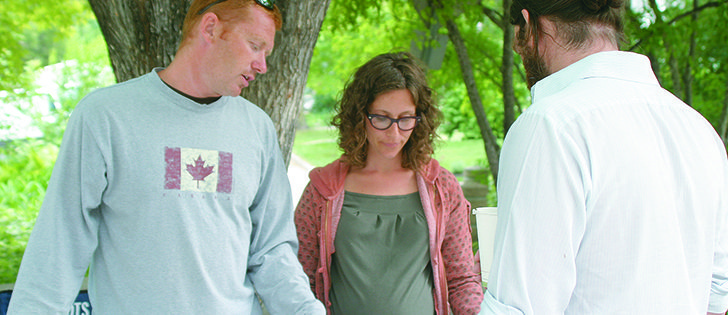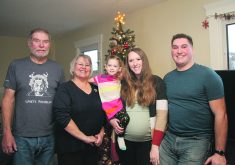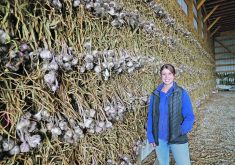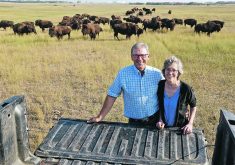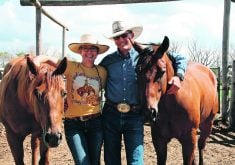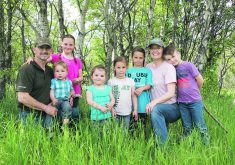Small farmers sell products from their pasture-raised chickens, grass-fed beef and heritage breed pigs at farmers markets
ALTONA, Man. — Evan and Katie Erlandson backed into farming from unlikely directions, but they revel in the agricultural life.
“I love how family-oriented it is,” said Katie, a Wisconsin woman who married local boy Evan eight years ago and is now pregnant with their fourth child.
“The kids can be out there with him. We’re such a team. We all have the same goal and when you believe in what you do, the product you provide, all the work seems easy.”
Read Also

Know what costs are involved in keeping crops in the bin
When you’re looking at full bins and rising calf prices, the human reflex is to hold on and hope for more. That’s not a plan. It’s a bet. Storage has a price tag.
Evan spends most of the day attending the family’s chickens, pigs and cattle as well as managing the small farm’s pasture, something that delights him after years of office work.
“It’s a lot of physical labour, but I’m not complaining. It feels so much better,” said Evan as he cleaned up after slaughtering chickens.
“With my former jobs, I hadn’t worked with my hands all day. Every month, I weighed more than I weighed the month before.”
Evan and Katie have bridged the urban and rural worlds and negotiated the space between large commodity agriculture and small-scale, high labour niche production.
Evan knows the hard-nosed, high capital commercial grain world and still has many friends involved with it, but for him to farm, he was forced to go the other way, albeit willingly.
“I didn’t want the chance to conquer the world with a 20,000 acre grain farm …,” said Evan, as he got ready to check on his pasture raised chickens.
Evan grew up helping on his grandfather’s small, mixed farm but never saw himself becoming a farmer because the farm only had 240 acres. Instead of trying to get into farming, he went to the University of Manitoba and earned an agriculture diploma and discovered he loved economics and marketing.
He went back to Altona in 2003 after graduating and worked for the Altona Bunge canola plant for five years before joining FarmLink Marketing in 2008.
At FarmLink, he worked first as a marketing adviser for sophisticated, large acreage grain farmers and then became a broker.
But he began feeling dissatisfied with office and business life and told his bosses in late summer 2011 that he might leave to start farming.
Evan had read small farming guru Joel Salatin’s hallmark book, had visited his farm and embraced the vision.
He’d also crunched the numbers and decided it wasn’t a flaky, la-la land idea but a sustainable and likely profitable business.
So the couple went for it and Evan left his job behind and began living off the money the family could make from its chickens, open-air heritage breed pigs and grass-fed beef.
Katie admitted throwing out security for a vision that might not become reality was a little unsettling, but she was keen to do it.
“It’s scary but when you have faith, you can live on a prayer. The Lord provides,” she said as she stood behind a cooler of the family’s frozen meats at a Winnipeg farmers market. “We’ve always had food and the electricity hasn’t been turned off.”
Katie and Evan sell their products from the farm and at farmers markets. They have only small numbers of livestock but are able to make a living by keeping their production costs low, doing the chicken slaughtering themselves, storing their own products and doing the hands-on marketing.
Evan estimates their meat costs about 20 percent more than commodity meat at the grocery store, but they have a strong and loyal customer base in people who want flavourful, local meat from farmers they have met and trust.
And that isn’t necessarily a customer base that despises large-scale agriculture, since all of Evan’s commercial grain clients from FarmLink have become customers of his farm now.
“The first people who supported us were my contacts and clients,” said Evan.
“It was humbling. They supported me right away and continue to do so.”
Evan learned a lot about how to set up and organize a new venture from FarmLink. His experience and education also told him it could work.
Now it all seems natural and the family of four spends most of its time together around the farmyard.
While Evan slaughtered chickens, Hope, 5, and Jakob, 6, played in the farm’s corn.
“It’s worth more than gold to me,” she said.“They go out and play (as Evan works) and they don’t even realize they’re learning to work.”


